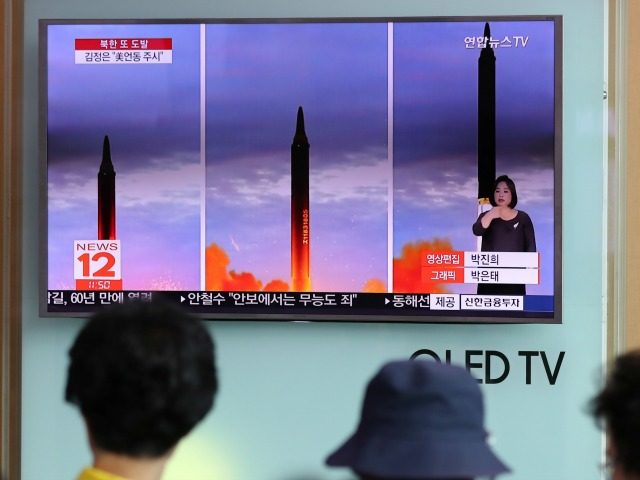North Korea’s government newspaper confirmed the launch of a “new-type tactical guided weapon” occurring on Thursday, describing it as necessary given the “annoying situation” with South Korea and warning Seoul to stop committing “suicidal acts” such as maintaining its military.
South Korean military officials said on Thursday that they had evidence two unknown projectiles, possibly new models of missiles, flew out of North Korea into the Sea of Japan (or East Sea in Korea) during apparent military exercises. The missiles were the first North Korea launched since May and appeared to be short-range. Dictator Kim Jong-un has focused on short-range defense since temporarily pausing nuclear weapons and intercontinental ballistic missile tests in 2017.
North Korea remains under strict international sanctions over the 2017 tests. Pyongyang claims it has since ended its nuclear weapons program to focus on economic development, but satellite evidence indicates that it continues to run its Yongbyon Nuclear Scientific Research Center, where the regime is believed to enrich the material it needs to build nuclear warheads.
North Korea claims it has offered to shut down Yongbyon in exchange for the world lifting sanctions on its economy.
Rodong Sinmun, North Korea’s government newspaper, credited Kim with personally overseeing the military exercises Thursday. Kim found the test “satisfactory,” according to the state report, and assured his officials that the missiles “would be hard to intercept.” Kim insisted, however, that the weapons were necessary only defensively because South Korea was investing in maintaining its military and thus posing a threat to Pyongyang.
“[H]e [Kim] said that the ultra-modern weapons and equipment which the bellicose forces of the south Korean military are introducing with desperate efforts are definitely offensive weapons and their purpose is absolutely clear,” Rodong Sinmun reported. “He stressed it is a work of top priority … to steadily develop powerful physical means and conduct the tests for their deployment for neutralizing those weapons posing undeniable threats to the security of the country immediately and turning them to scrap iron at an early stage when it is considered necessary.”
North Korean media do not capitalize the name of South Korea because the Kim regime does not recognize its sovereignty, instead viewing South Korea as its rogue province.
Kim also reportedly accused the leftist government of South Korean President Moon Jae-in of “strange double-dealing behavior,” agreeing to meet Kim personally but “behind the scene [sic], shipping ultra-modern offensive weapons and holding joint military exercises.”
Kim advised South Korea to “stop such suicidal act as the introduction of ultra-modern weapons and military exercises and come back to the proper stand” of accepting North Korea.
North and South Korea have technically been at war since 1950, as neither they nor the other two parties in the Korean War, China and America, have ever signed a peace treaty. The parties signed an armistice agreement that ended war hostilities in 1953, an occasion North Korea will celebrate as “Day of Victory in the Great Fatherland Liberation War” on Saturday.
North Korea refers to the Korean War as the “Great Fatherland Liberation War.”
While Kim personally described the missiles as a warning to South Korea, Rodong Sinmun also took the opportunity to defend Seoul in its ongoing trade dispute with Japan, which at its root is a disagreement over unresolved World War II crimes against South Korean women. Rodong Sinmun urged an “all-out anti-Japanese struggle” on Friday, citing the country’s Central Committee of the Anti-Imperialist National Democratic Front (AINDF). The newspaper supported growing boycotts of Japanese goods in South Korea, calling Japan’s trade disassociation with South Korea an “impudent and gangster-like economic invasion” and blaming South Korean conservatives for allegedly emboldening Japan to fight their own country.
The trade dispute began when Japan accused South Korea of violating sanctions on North Korea. Seoul responded by accusing Tokyo of the same thing, and a growing anti-Japanese movement has developed in South Korea. Koreans have launched boycotts of Japanese beer, food, and media; gasoline stations are refusing to sell fuel to owners of Japanese cars.
Rodong Sinmun complained that the Japanese “reactionaries,” incensed with South Korea, have also urged stricter adherence to international sanctions on the North.
“The present situation proves that unless the reckless acts of the Japanese political gangsters and south Korean conservative traitors against the nation and the people are frustrated, the history of national ruin in 1905 will repeat itself,” the North Korean propaganda outlet predicted.
Following the Russo-Japanese War, Japan and the Korean empire signed a treaty in 1905 that turned Korea into a Japanese colony. Japan formally annexed Korea in 1910 and lost its control over the region in 1945 following its defeat in World War II.
President Donald Trump sent National Security Adviser John Bolton to Seoul last weekend to help both sides seek a resolution to the dispute. The Trump administration considers both Japan and South Korea close allies and both nations house sizable numbers of American soldiers.

COMMENTS
Please let us know if you're having issues with commenting.